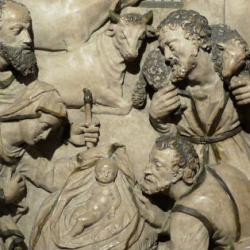‘Remember, O LORD, what has befallen us; Look, and see our reproach! Our inheritance has been turned over to strangers, Our houses to aliens. We have become orphans without a father, Our mothers are like widows.’ (Lamentations 5:1-3)
The Bible regularly speaks of the Lord’s particular care and concern for the plight of the widow and the orphan. The reason why is obvious: neither has a family to help them in their distress. They are vulnerable to predators. There are countless charges in the Bible for the community of God to alleviate their distress as an expression of God’s love.
It isn’t only the Bible that regards the state of the orphan as pitiable. We also see it in Classical Greek culture. For example, in Homer’s Odyssey, the story begins with a focus on the calamity that has befallen the hero Odysseus’s son, Telemachus. Telemachus has had to grow up as if he were an orphan.
Only when the gods intervene and Athena, the goddess of wisdom, appears as Mentor and provides Telemachus with his example does Telemachus make the transition to manhood. Symbolizing the encyclopedic aim of the epic itself, Mentor provides Telemachus with the paideia that only a mature man could provide.
Biblical doctrine declares that because of sin, all people, including Christians, are by nature objects of wrath. They are alienated from God. Yet by God’s unmerited grace, through adoption they are brought into the most intimate relation to Him.
So clear is this example in Scripture that one of the signal marks of the early church community was to imitate Him. Christian families rescued the abandoned babies of strangers from the elements and brought them up as their own adopted children. These orphans did not only receive food and raiment, but role models and teachers to feed their minds and hearts and souls.
The Paideia of God
That is because of the educational mandate that the synagogue and then later the church enjoined upon parents. It was to model in ‘life and doctrine‘ what their children were to imitate. They were to follow the paideia of God, and no longer to act as infants.
The centrality of the family as the means to nurture and to educate children, even those without parents, by following the moral example of fathers and mothers held all the way until the time of the Enlightenment.
The Idealization of the Orphan
Yet come the nineteenth century, it is abundantly clear although the actual state of being an orphan remained tragic, the view of orphans had changed. In fact, the estimation of the plight of the orphan had been utterly transformed. Not only were orphans no longer pitiable, they were increasingly held up as role models and cultural icons in the social fiction of the day.
This reversal is so utterly astonishing and so important that I will take a few blogs to explore it.
But briefly, instead of the Greek model of paideia, which was adopted and transformed by Christians in their education, the Western world embraced a new mode of education, with a completely different worldview and pedagogy.
The best word to describe it is the one that the Germans gave to it: Bildung, or self-cultivation. It was almost synonymous with the aims of the Enlightenment.
The appearance of the Bildungsroman was not just a new form of literature. It represented a subversion of family order and a revolt against maturity in favour of autonomy and self-realization.
The way that the Enlightenment ideal of autonomy was presented in culture and education is something I will have to explore further in the next blog.
Image by https://commons.wikimedia.org/w/index.php?curid=36636135












